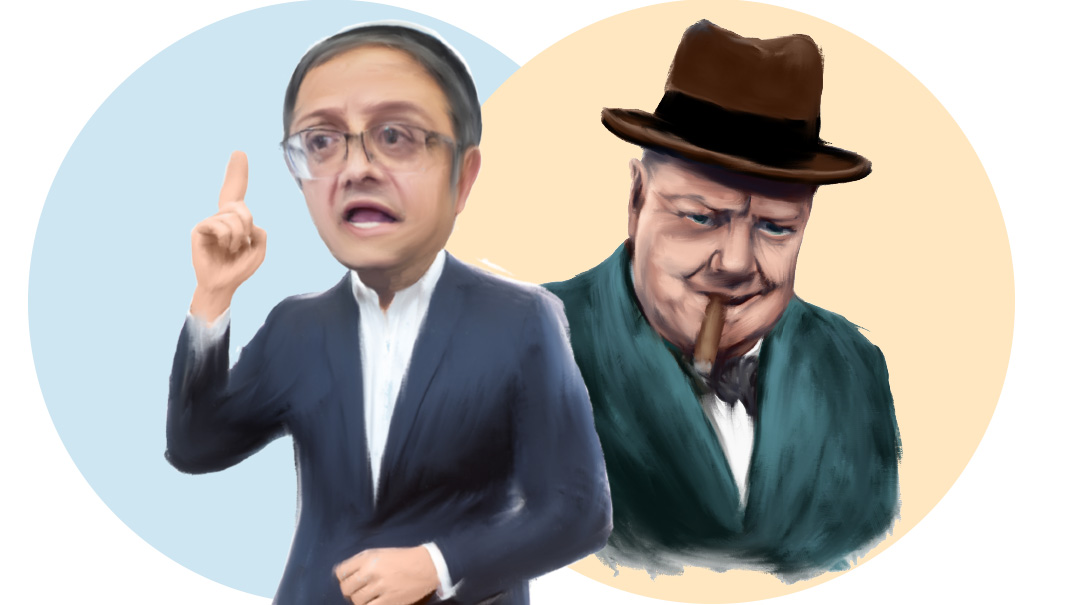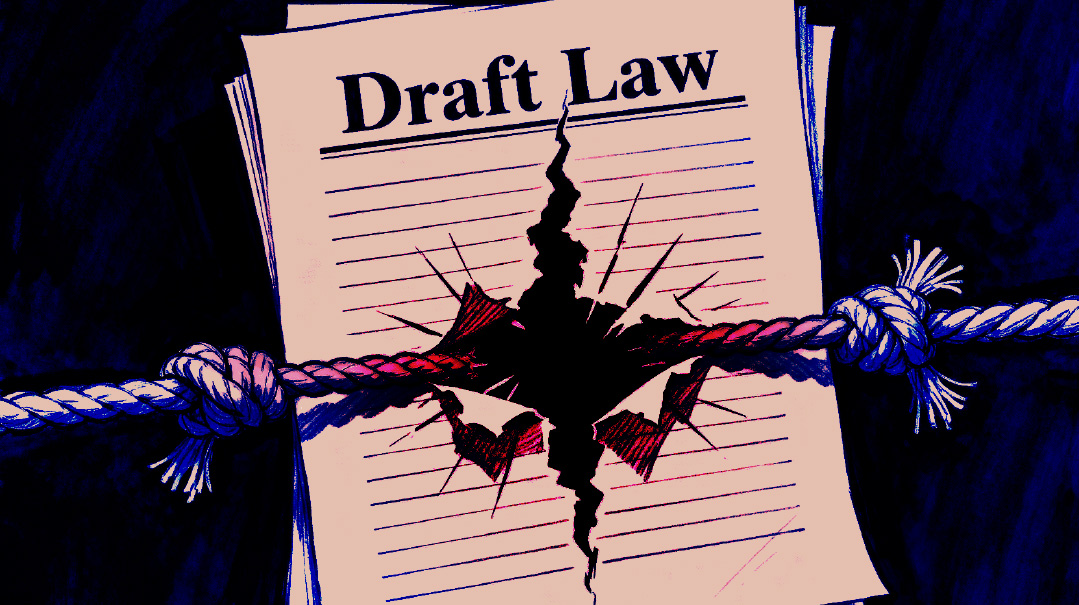Rogue Elephants Loom Large

The game-changing rise of Itamar Ben-Gvir

1.
Over the past three years, Israeli voters have wearied of the endlessly repeated ritual of election campaigns. The players barely change, the messaging is identical, and the campaign strategists — who have made a fortune over the past few years — have taken to recycling campaign slogans.
But occasional developments still show that the political world hasn’t remained static, as happened last week, with Otzma Yehudit chair Itamar Ben-Gvir — once considered a marginal figure on the right — announcing an independent run for the Knesset.
Ben-Gvir has shadowed the political world since he was a teenager. In the ’90s, he was interviewed holding a Cadillac emblem stolen from Prime Minister Yitzchak Rabin’s car.
“If we can get to this emblem, we can get to Rabin,” he said then.
We all remember how Rabin’s term ended.
Ben-Gvir founded Otzma Yehudit along with Baruch Marzel from Chevron, a student of Rabbi Meir Kahane Hy”d, founder of the banned Kach movement. But unlike Rabbi Kahane’s students, Ben-Gvir relies on brain rather than brawn.
He completed his legal studies after successfully appealing the Israel Bar Association’s refusal to let him take the exam. As a high-profile activist attorney, he’s become the right wing’s go-to advocate for detainees from riots and outposts in Judea and Samaria.
Over the years, the High Court has struck down the candidacies of other Kahane accolytes due to their extreme statements, but Itamar Ben-Gvir, a resident of Kiryat Arba, learned to outsmart the system.
“I’ll never be canceled,” he told me once with a wink.
And he was right. In his long, provocative history, he’s had the acumen to steer clear of anything the High Court could interpret as racism — and use to strike down his Knesset candidacy.
2.
The first two times Ben-Gvir ran independently, he failed to cross the electoral threshold, costing the right wing tens of thousands of votes. But since then, as the political crisis has deepened, Ben-Gvir has strengthened his hold on the base, going from pariah to key player.
In the last campaign, Ben-Gvir’s Otzma Yehudit ran a joint list with the Religious Zionist Party, led by Bezalel Smotrich, a former ally of Naftali Bennett.
The Otzma Yehudit chairman could not have hoped for a better setting during his first year in the Knesset. When Bennett formed a government dependent on Arab MKs, Ben-Gvir exploited the opportunity to the fullest, becoming a lionized figure on the right-wing street — secular, dati-leumi, and even chareidi — with favorability ratings second only to Netanyahu’s.
Ben-Gvir comes back to the negotiations with the Religious Zionist Party from a position of strength, after netting seven seats in a poll published after his announcement. The negotiations with Smotrich have largely taken place through the media, which is addicted to his colorful statements. When Smotrich didn’t meet his demands, he announced an independent run last week.
There’s less than a month until the deadline for presenting party lists. Likud chairman Binyamin Netanyahu immediately commissioned an internal poll to understand the potential ramifications of the split, and the numbers shocked him. According to Netanyahu’s poll, Ben-Gvir will pick up almost eight seats, while Smotrich is hovering right around the electoral threshold.
To prevent the loss of critical right-wing votes, Netanyahu has set himself the goal of doing everything possible to throw Ben-Gvir and Smotrich back together before the deadline. Only this time, Ben-Gvir will arrive at the negotiating table standing a little bit taller.
3.
Bibi: My Story is the title of Binyamin Netanyahu’s upcoming book, which will appear in English and Hebrew — in that order. Netanyahu’s role model as both a leader and a writer is Winston Churchill, the UK’s iconic World War II leader.
Churchill was a prolific writer who for many years lived off sales of his books across the English-speaking world, especially in the US. As the son of a historian, Bibi sees Churchill as the archetype of a heroic leader, but also recognizes the importance of his writing to his legacy.
Bibi’s fondness for Cuban cigars is another side effect of his admiration for the British leader who served as a bulwark for Europe — and the world — against Nazism.
During Bibi’s last visit to the UK, the British press brought up an interesting historical detail: Churchill himself, it seems, was dependent on foreign financiers, who shipped him crates of champagne and cigars in peace and war. When the German torpedo threat was at its height, the quality of the gifts only went up.
At the Churchill Museum in London, located in the bunker the Cabinet used during World War II, the crates of champagne and whiskey that made it through the German blockade, under fire, are still on display.
It must be counted as good fortune for Churchill — and the world — that the British were not gifted at that time with legal luminaries like the ones who have turned Bibi’s Churchillian extravagance into a criminal indictment.
4.
There are few Churchill biographies that Bibi hasn’t read — in the original. Among his favorites is The Churchill Factor by his friend Boris Johnson, the retiring UK prime minister who also ran No. 10 Downing Street like a bull in a china shop.
In a chapter titled “Rogue Elephant,” Johnson recounts how the UK’s senior civil servants turned up their noses at Churchill’s drinking habits and love of cigars. They saw his supporters as “gangsters” and self-seeking warmongers. Reading of the Churchillians, Bibi was reminded of the way his own supporters, the so-called Bibi-ists, are caricatured.
Bibi seeks to learn from Churchill’s failures — of which there was no shortage — rather than his successes over the years.
During World War I, between the wars, and in the dramatic moments of the West’s capitulation to Hitler in Munich on the eve of the war — Churchill suffered defeat after defeat, but never gave up.
Netanyahu takes one final lesson from Churchill’s landslide defeat in the first elections after the war, based on the analysis of respected British historian and Churchill biographer Geoffrey Best.
Sometimes, replacing a proven leader with a wooden non-entity can change the course of a nation’s history. In the critical months and years after the war, the UK lost all influence in a Europe carved up between American and Soviet spheres of interest — the only European leader of any stature, Winston Churchill, being banished to the opposition benches by British voters.
A nation’s economic and military strength is, as Chazal said — l’havdil — about the Torah, as difficult to acquire as vessels of gold and as vulnerable as vessels of glass. It seems that little has changed since them.
(Originally featured in Mishpacha, Issue 925)
Oops! We could not locate your form.






